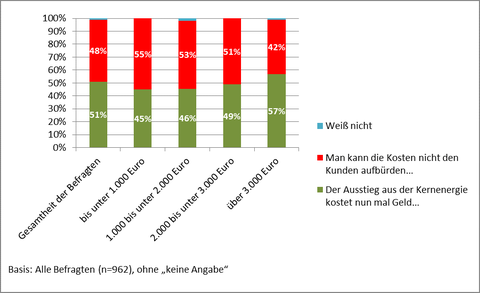Oct 01, 2014
Boysen-TUD Energie-Surveys
The Research Training Group, funded by the Boysen Stiftung and TU Dresden, has conducted two representative surveys within Germany concerning sustainable energy systems each with just under 1000 respondents („Boysen-TUD Energie-Surveys“). One question in the first survey wave (October/November 2013) investigated the correlation between withdrawal from the nuclear energy programme and electricity costs. It was posed as follows:
And now a question concerning electricity supply: The Federal government has decided upon the German withdrawal from nuclear energy starting in 2011. However this change in energy policy will lead to increasing electricity costs. I will now read two opinions, please tell me afterwards with which of the two you agree with most.
Possible answers:
- The withdrawal from the nuclear energy programme is costly. It is okay that customers take part in paying higher electricity prices.
- You can’t burden customers with higher costs due to the withdrawal from nuclear energy. The retention period of nuclear power plants has to be extended if necessary.
- Don’t know.
The results show two fractions of respondents: one half stated that they would be willing to pay higher electricity costs in favour of the withdrawal from nuclear energy, and the other half would not (see chart).
However, significant differences arise out of the analysis of the respondent’s income. With increasing income, willingness to pay for withdrawal also increases. 55% of respondents with income under 1000€ per month decided in favour of extended retention time for nuclear power plants in order to avoid higher electricity costs. Whereas just 42% of respondents with incomes over 3000€ chose that option. Thus the first group shows a higher sensibility for rising energy costs compared to the higher income group.

